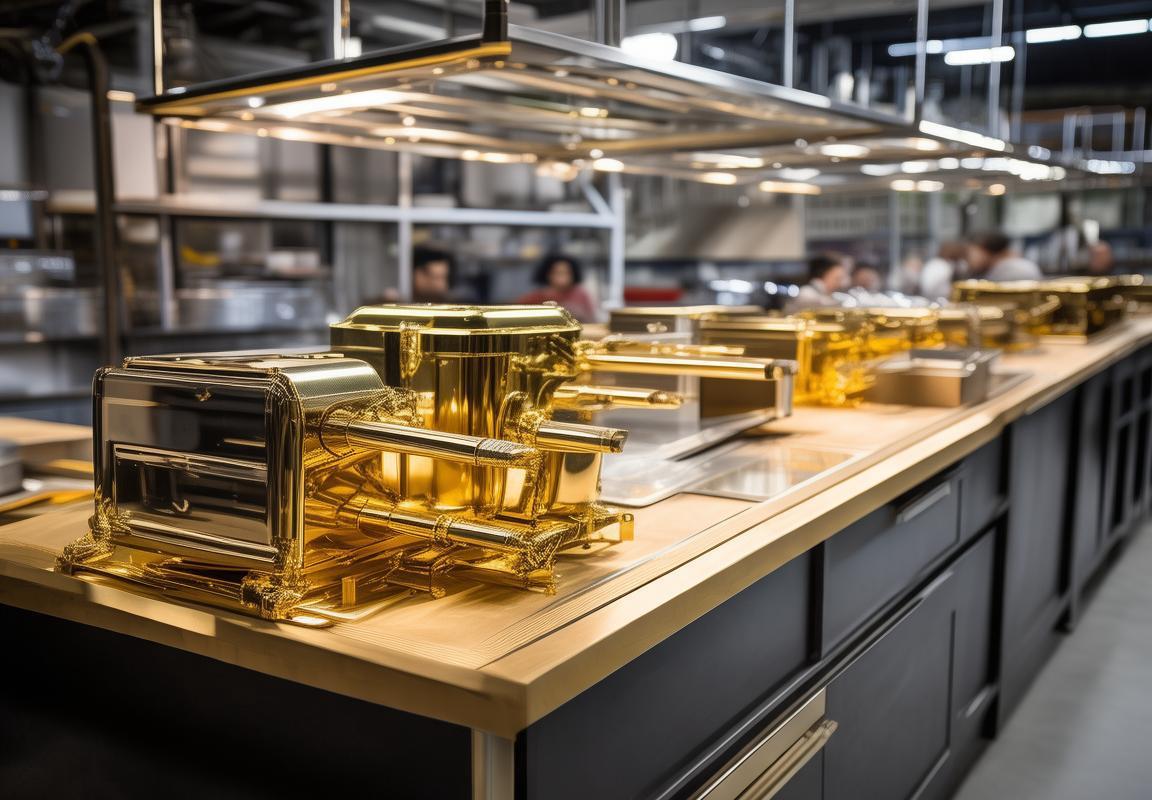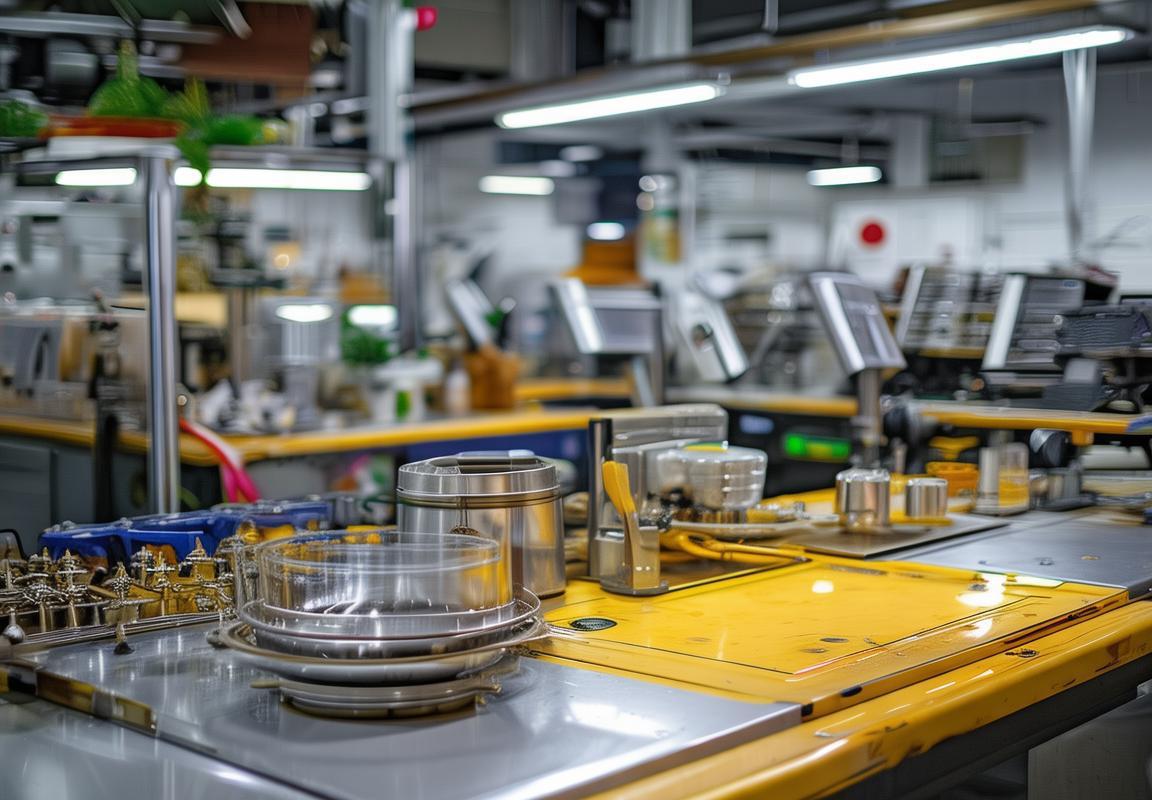In today’s dynamic marketplace, the role of Original Equipment Manufacturers (OEMs) has become increasingly pivotal, particularly within the realm of kitchen appliances. This unique approach to production allows brands to tap into a world of possibilities, offering tailored solutions that can revolutionize the way consumers interact with their home essentials. From custom features to cutting-edge technology, OEM kitchen appliances are shaping the future of domestic convenience. Let’s delve into the transformative power of OEM manufacturing and why it’s a smart choice for anyone looking to elevate their kitchen experience.
The Rise of Customization in Kitchen Appliances
In recent years, the kitchen appliances market has witnessed a remarkable shift towards customization. This evolution has been driven by the ever-growing demand for unique and personalized products that cater to the specific needs and preferences of consumers. As the heart of modern homes, the kitchen has become a canvas for personal expression, and this trend has spurred a surge in the demand for tailored kitchen appliances.
The rise of e-commerce and social media has also played a significant role in popularizing the concept of customization. Consumers are now more connected than ever, with endless inspiration at their fingertips. From Pinterest boards to Instagram feeds, homeowners are bombarded with ideas for their dream kitchens. This influx of ideas has sparked a desire for appliances that not only serve their functional purposes but also reflect their personal style.
One of the primary reasons for this surge in customization is the increasing diversity among consumers. Kitchens come in various sizes, layouts, and design styles, and the standard offerings from major appliance brands may not always fit the bill. Homeowners are seeking appliances that can seamlessly integrate into their unique kitchen environments, whether it’s a sleek, modern minimalist space or a cozy, traditional setting.
Moreover, the modern kitchen is not just a place for cooking but also for entertainment, socializing, and working. This multifunctional aspect of the kitchen has led to the demand for appliances that offer versatility and adaptability. Consumers want appliances that can accommodate their evolving lifestyle needs, from smart features that enhance convenience to energy-efficient designs that promote sustainability.
OEM (Original Equipment Manufacturer) kitchen appliances manufacturers have emerged as the go-to solution for this trend. By partnering with these specialized companies, brands can offer their customers a wider array of customized options. OEM manufacturers have the expertise and resources to create appliances that are tailored to the exact specifications required by the end-user, ensuring a perfect fit for every kitchen.
The customization process typically begins with a deep understanding of the consumer’s needs. OEM manufacturers conduct thorough research to identify market trends, consumer preferences, and emerging technologies. This research helps them develop new and innovative products that can be customized to meet specific requirements.
Design flexibility is a key aspect of customization offered by OEM manufacturers. They work closely with appliance brands to create custom designs that can range from subtle modifications to complete overhauls. This might involve changing the color, material, or finish of an appliance to match the kitchen’s aesthetic, or even reimagining the entire look and feel of the product.
Functional customization is equally important. OEM manufacturers can integrate advanced features such as smart connectivity, variable speed controls, and eco-friendly technologies into their appliances. This not only enhances the user experience but also aligns with the broader trend of technology integration in everyday life.
The rise of customization in kitchen appliances has also led to an increase in sustainable practices. Consumers are increasingly conscious of the environmental impact of their purchases, and OEM manufacturers are responding by offering energy-efficient appliances made with sustainable materials. This not only reduces the carbon footprint but also aligns with the brand’s commitment to sustainability.
Moreover, the customization process often involves collaboration between the OEM manufacturer and the appliance brand, fostering a sense of partnership. This collaborative approach allows for continuous innovation and ensures that the end product not only meets the consumer’s needs but also stands out in a crowded market.
In conclusion, the rise of customization in kitchen appliances is a testament to the evolving expectations of consumers. With the help of OEM manufacturers, appliance brands are able to offer a wider array of options that cater to the diverse tastes and requirements of homeowners. This trend is likely to continue, as consumers seek out products that are as unique as they are, and OEM manufacturers continue to push the boundaries of what’s possible in the kitchen.

Understanding OEM in Kitchen Appliances Manufacturing
In the ever-evolving world of kitchen appliances, the term “OEM” has become increasingly prevalent. But what exactly does it mean, and how does it impact the manufacturing process? Let’s delve into the nuances of OEM in kitchen appliances manufacturing.
OEM stands for Original Equipment Manufacturer, a term that refers to a company that produces goods or components that are branded and sold by another company. In the context of kitchen appliances, this means that while the final product bears the name of the brand that sells it, the actual manufacturing is carried out by an OEM partner.
One of the primary reasons for the rise of OEM in kitchen appliances is the demand for customization. Consumers today are looking for appliances that not only meet their functional needs but also align with their personal style and kitchen design. OEM manufacturers can cater to this demand by creating customized appliances that are tailored to specific requirements, whether it’s a unique size, color, or feature set.
The relationship between an OEM manufacturer and a brand is often a strategic one. OEMs have the expertise, resources, and production capabilities to produce high-quality appliances efficiently. Brands, on the other hand, can leverage this partnership to expand their product line, enter new markets, or introduce innovative features without the need to invest heavily in their own manufacturing facilities.
When it comes to the manufacturing process, OEMs play a crucial role in ensuring that the products meet the brand’s standards. This involves a close collaboration between the OEM and the brand, with regular communication and quality control checks at every stage of production. From design and engineering to assembly and testing, the OEM is responsible for the entire manufacturing process, ensuring that the final product is up to par.
One of the key advantages of working with an OEM is the ability to scale production quickly. As consumer preferences change and market demands fluctuate, brands can rely on their OEM partners to adjust production volumes accordingly. This agility allows brands to stay competitive and responsive to market trends without the constraints of maintaining their own manufacturing operations.
Another important aspect of OEM manufacturing is the cost-effectiveness it offers. By outsourcing the production of kitchen appliances to an OEM, brands can reduce their overhead costs and focus on other areas of their business, such as marketing and customer service. OEMs often have access to bulk purchasing discounts and can optimize their production processes to minimize waste, further enhancing cost savings.
Innovation is also a significant driver behind the popularity of OEM in kitchen appliances. OEM manufacturers are often at the forefront of technological advancements, investing in research and development to create cutting-edge appliances. This allows brands to offer their customers the latest features and functionalities without the need for extensive in-house innovation capabilities.
Moreover, OEM partnerships can extend beyond the production of individual appliances. Many OEMs offer comprehensive solutions, including the design and production of entire kitchen appliance lines. This can be particularly beneficial for brands looking to establish a cohesive and integrated kitchen experience for their customers.
When selecting an OEM partner, brands must consider several factors. Experience and reputation are crucial, as a reliable OEM can make or break the success of a product. It’s also essential to ensure that the OEM shares the same values and quality standards as the brand. This alignment is key to maintaining brand integrity and customer satisfaction.
Furthermore, the ability of the OEM to adapt to changing regulations and certifications is vital. As environmental and safety standards evolve, OEMs must be able to adjust their manufacturing processes accordingly to ensure compliance. This flexibility is not only important for regulatory reasons but also for maintaining the brand’s reputation for quality and responsibility.
In conclusion, OEM in kitchen appliances manufacturing is a strategic partnership that offers numerous benefits. From customization and cost savings to innovation and scalability, the collaboration between OEMs and brands is reshaping the industry. By understanding the role and value of OEMs, brands can enhance their product offerings and stay ahead in a competitive market.

Key Benefits of Choosing an OEM Kitchen Appliances Manufacturer
OEM kitchen appliances manufacturers offer a range of benefits that can significantly enhance the capabilities and appeal of your brand. From cost savings to expert craftsmanship, here’s a closer look at some of the key advantages:
-
Cost-Effective Production: Partnering with an OEM (Original Equipment Manufacturer) for your kitchen appliances means you can take advantage of their established production processes and economies of scale. This often leads to lower production costs, as OEMs can source materials and components at a bulk rate, reducing the overall cost per unit for your brand.
-
Focus on Core Competencies: By outsourcing the manufacturing of kitchen appliances to an OEM, your company can concentrate on its core strengths, such as product design, marketing, and customer service. This strategic decision allows for a more streamlined operation, where each team member can excel in their specialized area.
-
Access to Cutting-Edge Technology: OEM manufacturers typically invest heavily in the latest technology and machinery. This ensures that the appliances they produce are at the forefront of innovation, offering advanced features and performance that can give your brand a competitive edge in the market.
-
Customization and Flexibility: An OEM kitchen appliances manufacturer can tailor the production to meet your specific needs. Whether it’s a particular design, size, or functionality, the flexibility to customize products allows your brand to cater to niche markets or offer unique selling propositions.
-
Quality Control: Reputable OEMs adhere to stringent quality control standards. This means that the kitchen appliances they produce are likely to meet or exceed industry expectations. By leveraging the expertise of an OEM, you can ensure that your brand maintains a high level of quality and reliability.
-
Rapid Time-to-Market: If you’re looking to launch a new product quickly, an OEM can be a game-changer. These manufacturers are equipped to handle large orders and can often expedite the production process, allowing your brand to hit the market faster and capture consumer interest sooner.
-
Reduced Risk: Developing and manufacturing kitchen appliances in-house can be risky, especially if you’re entering a new market or introducing a new product line. By working with an OEM, you can mitigate these risks, as they often have a wealth of experience in various industries and can help navigate potential pitfalls.
-
Sustainability: Many OEMs are committed to sustainability and eco-friendly practices. This not only aligns with the values of environmentally conscious consumers but also reduces the environmental impact of your products. By choosing an OEM that prioritizes sustainability, your brand can appeal to a broader customer base.
-
Scalability: As your business grows, so does the demand for kitchen appliances. An OEM can scale production up or down as needed, ensuring that you can meet increased demand without the need for substantial investments in new facilities or equipment.
-
Compliance and Certification: Kitchen appliances must comply with various safety and regulatory standards. An OEM that is well-versed in these requirements can ensure that your products meet all necessary certifications, saving you time and resources in the certification process.
-
Global Reach: Many OEM manufacturers have a global presence, which means they can source materials from around the world and distribute products to a wide range of markets. This can open up new opportunities for your brand to expand its reach and customer base.
-
Expertise in Supply Chain Management: An experienced OEM can manage the entire supply chain, from sourcing raw materials to shipping finished products. This expertise can lead to more efficient operations and help avoid disruptions that could impact your business.
-
Continuous Improvement: OEMs often have dedicated teams focused on continuous improvement. This means they are constantly looking for ways to enhance the design, functionality, and efficiency of kitchen appliances, which can benefit your brand with ongoing product enhancements.
-
Marketing and Branding Support: Some OEMs offer additional support in marketing and branding, helping your brand to stand out in the market. This could include co-branding opportunities, packaging design, and even marketing campaigns that align with your brand identity.
By choosing an OEM kitchen appliances manufacturer, you’re not just getting a product; you’re gaining a strategic partner that can help you navigate the complexities of manufacturing, distribution, and market trends. This collaboration can lead to a stronger, more competitive brand and a more sustainable business model.

The Process of Collaborating with an OEM Manufacturer
Collaborating with an OEM (Original Equipment Manufacturer) kitchen appliances manufacturer can be a seamless and rewarding process. Here’s a detailed look at what you can expect:
Navigating through the initial contact, the first step is to clearly define your requirements. This involves outlining the specific features, design specifications, and performance criteria for the kitchen appliances you wish to produce. It’s crucial to be as detailed as possible to ensure that the OEM understands your vision and can provide a solution that aligns with your expectations.
Once your requirements are established, the OEM will embark on a thorough design phase. This stage involves sketching out initial concepts, which are then refined through multiple iterations. The design process may include 3D modeling, CAD drawings, and prototype creation to visualize the product and make any necessary adjustments before moving forward. Effective communication is key during this phase, as feedback and revisions are critical to achieving the desired outcome.
Upon finalizing the design, the next step is to select the right materials and components for your kitchen appliances. The OEM will have a wealth of experience in sourcing high-quality parts, and they’ll work with you to choose the best options that meet your quality standards and budget constraints. This selection process ensures that the final product is not only aesthetically pleasing but also durable and functional.
Once the materials and components are chosen, the manufacturing process begins. This is where the OEM’s expertise truly shines. They’ll manage the production line, ensuring that each appliance is assembled with precision and care. Quality control checks are conducted at various stages to guarantee that each unit meets the required specifications. The process may involve robotics, automated systems, and skilled labor to create a consistent and high-quality product.
During the production phase, it’s important to maintain regular communication with the OEM. They should provide updates on the progress of your order, including production milestones and any potential delays. This open line of communication allows you to stay informed and make any necessary adjustments to your specifications or timelines as the project evolves.
Upon completion of the manufacturing process, the OEM will inspect the final products to ensure they meet your quality standards. This includes both visual inspections and functional tests to verify that the appliances work as intended. If any issues arise, the OEM will work with you to resolve them promptly, either by rectifying the defect or by replacing the affected units.
After the quality control is passed, the next step is logistics. The OEM will handle the packaging of the kitchen appliances, ensuring that they are securely wrapped and ready for shipment. Depending on your needs, they may offer different shipping options, from standard to expedited delivery, to accommodate your timeline and distribution requirements.
Upon delivery, it’s crucial to conduct your own quality assurance checks. This ensures that the appliances arrive in perfect condition and are ready for installation or sale. The OEM should be available to assist with any post-delivery issues or inquiries that may arise.
Throughout the collaboration, it’s beneficial to have a dedicated point of contact at the OEM. This person will serve as your main liaison, managing all aspects of the project and ensuring that your needs are met. They’ll be responsible for coordinating with the various departments within the OEM, from design and engineering to manufacturing and logistics.
Collaborating with an OEM manufacturer for kitchen appliances also opens the door to ongoing support and potential future projects. The OEM can provide maintenance and repair services, as well as assist with product updates and enhancements. This long-term partnership can be invaluable, offering a consistent supply of high-quality appliances and the flexibility to adapt to changing market demands.
In summary, the process of collaborating with an OEM manufacturer for kitchen appliances is a well-defined and collaborative journey. From defining your requirements and designing the product to manufacturing, quality control, and delivery, each step is carefully managed to ensure that the final result meets your expectations. Maintaining open communication, leveraging the OEM’s expertise, and establishing a strong working relationship are key to a successful partnership.

Top Features to Look for in an OEM Kitchen Appliances Manufacturer
In the world of OEM kitchen appliances manufacturing, the choice of a partner can significantly impact the quality and success of your product line. Here are some top features to consider when selecting an OEM manufacturer:
-
Extensive Product RangeAn OEM manufacturer with a broad range of products can offer a diverse selection that caters to various market needs. Look for a partner that provides a comprehensive catalog, from basic appliances like refrigerators and ovens to specialized items like wine coolers and induction cooktops.
-
Customization CapabilitiesThe ability to customize is crucial for brands looking to differentiate themselves. Ensure that the OEM manufacturer can tailor designs, features, and even branding to align with your specific product vision and market strategy.
-
Quality Control and StandardsThe reputation of an OEM manufacturer is often tied to the quality of their products. Check for certifications such as ISO 9001, which indicates a commitment to quality management systems. A robust quality control process should be in place to ensure that every appliance meets or exceeds industry standards.
-
Advanced Technology and InnovationA forward-thinking OEM manufacturer invests in cutting-edge technology and innovation. This could include state-of-the-art manufacturing processes, eco-friendly materials, or smart features that enhance the user experience. Look for a partner that is continuously evolving to stay ahead of the curve.
-
Strong Supply Chain ManagementThe efficiency of an OEM manufacturer’s supply chain can greatly affect your production timelines and costs. A reliable partner should have a streamlined process that minimizes lead times, reduces inventory, and ensures a steady supply of components and finished goods.
-
Cost-Effective SolutionsWhile quality is paramount, cost-effectiveness is equally important. An OEM manufacturer that offers competitive pricing without compromising on quality can help you maintain a competitive edge in the market. Be wary of manufacturers who might cut corners to offer lower prices.
-
Flexibility in Production VolumeYour business may experience fluctuations in demand. Choose an OEM manufacturer that can adapt to changes in production volume, whether it’s scaling up for a major launch or scaling down during slower periods.
-
Excellent Communication and CollaborationEffective communication is key to a successful partnership. Look for an OEM manufacturer that values open dialogue, is responsive to your needs, and is willing to collaborate closely with your team. This includes regular updates, clear documentation, and a willingness to make adjustments based on feedback.
-
Compliance with RegulationsEnsure that the OEM manufacturer is well-versed in the regulations and standards that apply to your market. This includes safety certifications, energy efficiency requirements, and any other legal obligations that may affect your product’s marketability.
-
Post-Manufacturing SupportA good OEM manufacturer doesn’t just stop at production. They should offer support services such as installation, maintenance, and customer service. This can help maintain your brand’s reputation and customer satisfaction.
-
Sustainability PracticesWith growing environmental concerns, sustainability has become a key factor in consumer choices. An OEM manufacturer that practices environmentally responsible production and uses sustainable materials can enhance your brand’s green credentials.
-
Global Reach and ExperienceIf your market extends beyond local borders, consider an OEM manufacturer with a global presence and experience. They should understand international regulations, shipping logistics, and cultural nuances that can impact your product’s success in foreign markets.
By focusing on these features, you can ensure that your partnership with an OEM kitchen appliances manufacturer is a fruitful one, leading to high-quality products that meet your brand’s standards and resonate with your customers.

Success Stories: How OEM Has Enhanced Brands
In the world of kitchen appliances, Original Equipment Manufacturer (OEM) partnerships have become a game-changer for brands looking to innovate and differentiate. Let’s dive into some success stories that showcase how OEM collaborations have elevated brands to new heights.
-
Brand A’s Custom Oven Line: When Brand A, a well-known appliance retailer, sought to expand its product line, they turned to an OEM manufacturer to create a unique oven series. The OEM team meticulously crafted a range of sleek, energy-efficient models that were a perfect fit for Brand A’s target market. The result? Sales soared, and the brand gained a reputation for offering cutting-edge kitchen solutions.
-
Brand B’s Smart Kitchen Lineup: Brand B, a mid-tier kitchen appliance company, wanted to break into the high-tech appliance market. By partnering with an OEM manufacturer specializing in smart technology, they developed a line of interconnected kitchen appliances that offered seamless integration with smartphones and home automation systems. This strategic move not only boosted Brand B’s market share but also positioned them as a leader in smart kitchen solutions.
-
Brand C’s Eco-Friendly Range: Recognizing the growing demand for sustainable products, Brand C decided to launch an eco-friendly kitchen appliance collection. They collaborated with an OEM manufacturer known for its green manufacturing processes. The partnership resulted in a range of energy-saving appliances made from recycled materials, which resonated with environmentally conscious consumers. Brand C’s reputation as a responsible brand was strengthened, and they saw a significant increase in customer loyalty.
-
Brand D’s Luxury Kitchen Series: A luxury appliance brand, Brand D, desired to expand its product line without compromising on quality. They partnered with an OEM manufacturer that had a track record of producing high-end appliances. Together, they crafted a series of kitchenware that featured premium materials, elegant designs, and innovative technology. The collaboration allowed Brand D to maintain its luxury status while offering a wider variety of products to its discerning clientele.
-
Brand E’s Niche Market Targeting: Brand E, a small startup specializing in unique kitchen gadgets, needed to find a way to produce their innovative products without the high costs of setting up their own manufacturing facility. By partnering with an OEM manufacturer, they were able to bring their creative ideas to life. The OEM manufacturer’s expertise in prototyping and production helped Brand E quickly launch their products into the market, gaining traction with niche consumers and securing a solid customer base.
-
Brand F’s Global Expansion: As Brand F aimed to expand into international markets, they needed a reliable OEM partner to ensure consistent product quality across different regions. The OEM manufacturer they chose not only shared their commitment to quality but also had a global presence. This partnership allowed Brand F to navigate the complexities of international logistics and regulations, ensuring a smooth expansion and a strong market presence in new territories.
-
Brand G’s Revitalized Brand Image: Brand G, once a leader in the kitchen appliance industry, had fallen behind in innovation. To regain its position, they decided to refresh their product line with cutting-edge technology. By partnering with an OEM manufacturer known for its cutting-edge designs, Brand G was able to introduce a new generation of appliances that were both stylish and functional. This OEM collaboration helped Brand G revitalize its brand image and regain consumer trust.
-
Brand H’s Customization Flexibility: Brand H, a premium appliance brand, wanted to offer their customers a level of customization not typically seen in the industry. They turned to an OEM manufacturer that excelled in custom design and production. This partnership enabled Brand H to create tailor-made appliances that met the specific needs and tastes of their clients, setting them apart from competitors and fostering a strong, personal connection with their customers.
These success stories highlight the transformative power of OEM partnerships in the kitchen appliances sector. By leveraging the expertise and resources of OEM manufacturers, brands can innovate, expand, and differentiate themselves in a highly competitive market.

The Future of OEM Kitchen Appliances: Innovations and Trends
In the ever-evolving landscape of kitchen appliances, OEM (Original Equipment Manufacturer) partnerships have become a cornerstone for brands looking to innovate and stand out in a crowded market. The future of OEM kitchen appliances is poised to bring about a wave of innovations and trends that will reshape the way we interact with our kitchen spaces. Here’s a glimpse into what’s on the horizon:
Manufacturers are increasingly focusing on sustainability, and this trend is set to become even more pronounced in the realm of OEM kitchen appliances. From energy-efficient designs to recyclable materials, OEMs are exploring eco-friendly options that not only reduce the carbon footprint but also appeal to environmentally conscious consumers.
Smart technology integration is not just a buzzword; it’s a reality that’s rapidly becoming the norm. OEMs are at the forefront of incorporating AI, IoT, and machine learning into kitchen appliances. Expect to see appliances that can learn your habits, predict your needs, and even offer personalized cooking suggestions based on your dietary preferences.
Customization is becoming a cornerstone of the OEM kitchen appliances market. Brands are offering a plethora of options, from color choices to specialized features, allowing customers to tailor their appliances to their specific needs and tastes. This level of personalization is not just about aesthetics; it’s about creating a kitchen that truly reflects the user’s lifestyle.
Energy efficiency is no longer just a regulatory requirement; it’s a competitive edge. OEMs are pushing the boundaries of energy conservation, developing appliances that consume less power while maintaining or improving performance. This focus on efficiency is not only cost-effective for users but also contributes to a greener global environment.
The rise of modular kitchen appliances is reshaping the way we think about kitchen layouts. OEMs are creating components that can be mixed and matched, allowing for greater flexibility and adaptability. This modular approach means that as your kitchen or lifestyle changes, so can your appliances, without the need for a complete overhaul.
Health and safety are paramount in kitchen appliances, and OEMs are responding with advanced features that protect users and their homes. From childproof locks to smart sensors that detect leaks or unusual odors, appliances are becoming more vigilant guardians of the kitchen environment.
The rise of connected kitchens is a trend that’s gaining momentum. OEMs are developing appliances that can communicate with each other and with the user’s smart devices, creating a seamless and integrated kitchen ecosystem. This interconnectedness not only simplifies daily tasks but also opens up new possibilities for convenience and efficiency.
Innovation in materials is also a key trend. We’re seeing a shift towards materials that are not only durable but also aesthetically pleasing and easy to maintain. OEMs are experimenting with materials like stainless steel, glass, and even advanced composites to create appliances that are both functional and stylish.
The rise of subscription-based appliance services is another interesting development. OEMs are offering customers the option to rent appliances for a period, which can be particularly appealing for those who don’t want to make a significant upfront investment or who may move frequently. This model also allows for the easy upgrade to the latest technology as it becomes available.
Lastly, the focus on user experience is intensifying. OEMs are investing in user interface design and intuitive controls to ensure that appliances are not only powerful but also easy to use. The goal is to create appliances that work seamlessly with the user’s lifestyle, reducing stress and enhancing the overall kitchen experience.
As the future of OEM kitchen appliances unfolds, it’s clear that innovation and consumer needs will continue to drive the market forward. From sustainability to smart technology and customization, the next generation of kitchen appliances promises to be both functional and transformative.

Final Thoughts: Why OEM is a Smart Choice for Your Kitchen Needs
In today’s fast-paced and highly competitive market, the choice to go with Original Equipment Manufacturer (OEM) kitchen appliances can be a game-changer. It’s not just about acquiring products; it’s about aligning with a manufacturer that can tailor solutions to your unique needs. Here are a few reasons why opting for an OEM kitchen appliances manufacturer is a smart decision for your kitchen needs.
The ability to customize kitchen appliances to fit specific spaces is a significant advantage. Whether you’re dealing with an oddly shaped nook or a limited amount of counter space, an OEM manufacturer can design appliances that are not only functional but also visually appealing. This level of customization ensures that your kitchen doesn’t just work well but also looks cohesive and stylish.
Quality control is another key feature to consider. When you work with an OEM, you’re often dealing with a manufacturer that has a reputation for producing high-quality goods. They understand the importance of durability and reliability, which is crucial for kitchen appliances that are meant to last for years.
Energy efficiency is a growing concern for many consumers. OEM manufacturers are at the forefront of incorporating cutting-edge energy-saving technologies into their appliances. This not only helps reduce utility bills but also supports environmental sustainability. Choosing an OEM that prioritizes energy efficiency can be a smart choice for both your wallet and the planet.
The design and aesthetics of kitchen appliances have evolved significantly. Modern consumers are not just looking for functionality; they’re seeking appliances that complement their kitchen’s decor and personal style. An OEM manufacturer can offer a range of design options, from sleek stainless steel finishes to integrated appliances that blend seamlessly into cabinetry.
Innovation is a driving force in the kitchen appliance industry. OEM manufacturers often have access to the latest research and development, allowing them to introduce new features and technologies that can enhance the user experience. From smart features that allow you to control your appliances remotely to appliances that adapt to your cooking habits, innovation is key to staying ahead in the kitchen.
Collaboration with an OEM manufacturer is a strategic move. It allows businesses to leverage the expertise of a trusted partner without the need to invest in extensive in-house production capabilities. This partnership can lead to a more agile and responsive production process, enabling companies to bring new products to market faster.
Flexibility is another critical aspect of working with an OEM. They can scale production to meet demand fluctuations, ensuring that you always have the right amount of inventory without overstocking. This adaptability is particularly beneficial for businesses that operate in markets with seasonal trends.
The supply chain management of an OEM can be a significant asset. They often have well-established networks that can source materials efficiently and ensure timely delivery. This reliability minimizes disruptions in production and keeps your kitchen needs met without delays.
Brand enhancement is a subtle yet powerful benefit of choosing an OEM. By aligning with a manufacturer that has a strong reputation, you can elevate your brand’s image. Consumers often perceive OEM products as high-quality and reliable, which can boost your brand’s credibility.
Customer satisfaction is paramount in the kitchen appliance industry. An OEM manufacturer that values customer feedback and continuously seeks to improve their products can significantly contribute to your ability to satisfy your customers. This focus on customer needs can lead to repeat business and positive word-of-mouth referrals.
In terms of financial considerations, working with an OEM can be cost-effective. They can often offer competitive pricing due to their economies of scale and streamlined production processes. This can translate into savings for your business without compromising on quality.
The trend towards sustainability is undeniable. An OEM that is committed to eco-friendly practices and sustainable materials can help you meet the demands of environmentally conscious consumers. This alignment with sustainability goals can also be a selling point for your brand.
As technology advances, the integration of smart features in kitchen appliances is becoming more common. An OEM manufacturer that specializes in this area can provide you with cutting-edge appliances that not only make cooking easier but also enhance the overall kitchen experience.
Finally, the long-term relationship you build with an OEM manufacturer can be invaluable. As they continue to evolve and innovate, you can benefit from these advancements without the need to switch partners. This continuity can lead to a deeper understanding of your needs and a more tailored approach to your kitchen requirements.
In conclusion, the reasons to choose an OEM kitchen appliances manufacturer are multifaceted. From customization and quality control to innovation and cost-effectiveness, the benefits are clear. For businesses looking to meet their kitchen needs with a strategic partner, an OEM manufacturer can be the key to unlocking a host of advantages that enhance both their products and their brand.